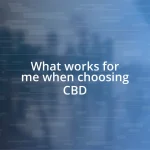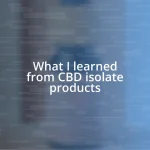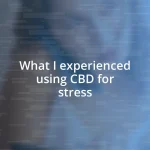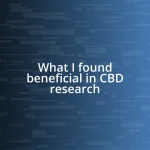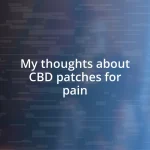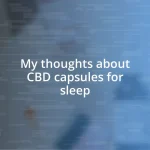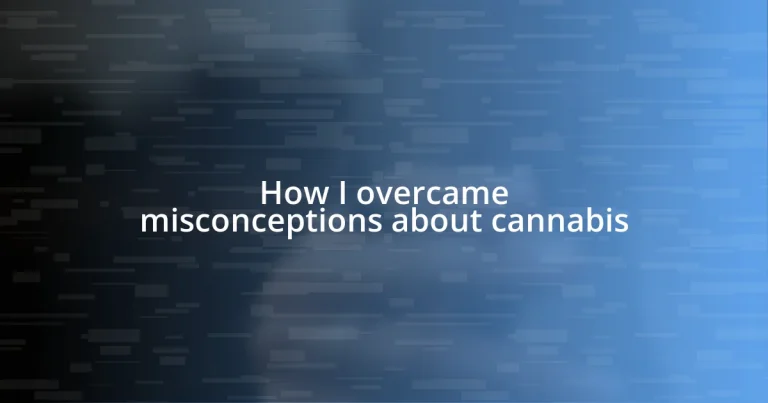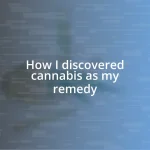Key takeaways:
- Understanding cannabis requires addressing outdated stereotypes, emphasizing its diverse uses like stress relief and anxiety management.
- Consulting medical professionals and participating in education groups can empower individuals with knowledge about cannabis benefits and safe practices.
- Promoting informed discussions and sharing personal experiences are crucial in reshaping perceptions and dismantling stigma surrounding cannabis use.
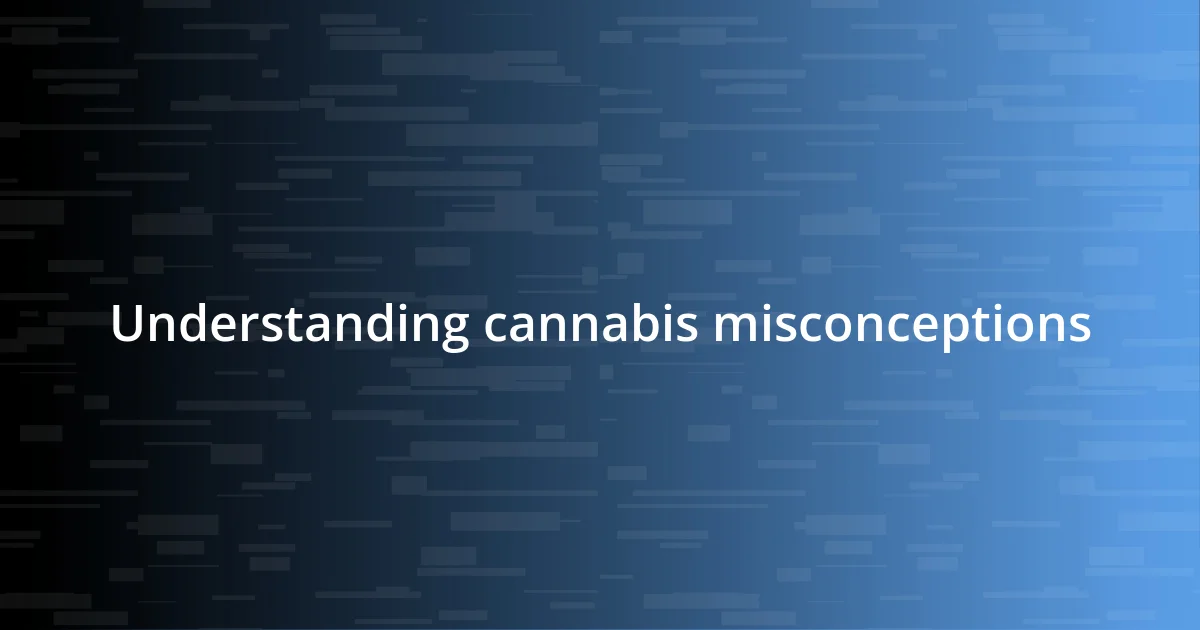
Understanding cannabis misconceptions
Misconceptions about cannabis often stem from outdated stereotypes and sensationalized media portrayals. I remember vividly the first time my parents found out I was exploring cannabis; their eyes were filled with concern, echoing years of beliefs that painted cannabis users as irresponsible or lazy. It made me wonder, what exactly drives these stereotypes? Isn’t it time we all took a closer look at the facts?
One common myth is that all cannabis users are just trying to escape reality. Reflecting on my experience, I found that many people, including myself, use cannabis for various reasons—managing anxiety, enhancing creativity, or simply unwinding after a long day. It was eye-opening to realize that a simple plant could be a tool for mindfulness rather than a mere vice.
Then there’s the persistent belief that cannabis leads to harder drugs, which I used to think was true. However, research shows that most cannabis users don’t transition to harder substances. This perspective shifted for me when I met someone who used cannabis as a recovery aid after battling addiction, proving to me that this plant can play a role in healing rather than harm. What if instead of judging, we started understanding the diverse reasons behind its use?
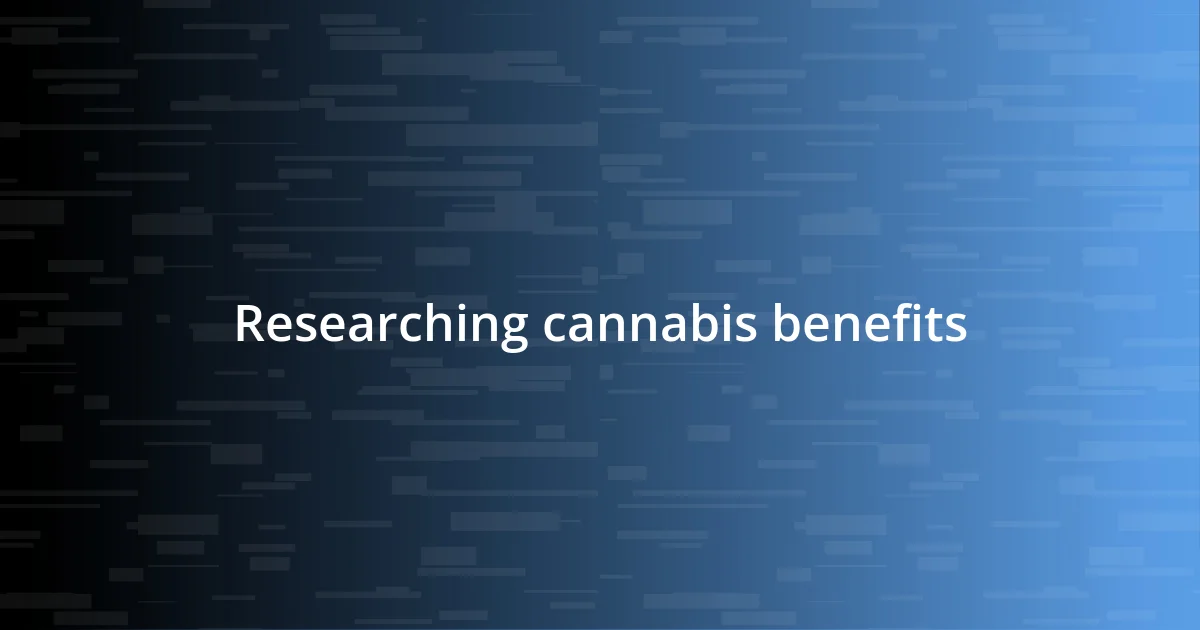
Researching cannabis benefits
During my journey to understand cannabis, I dove deep into various studies highlighting its potential benefits. For instance, I stumbled upon research suggesting that cannabis can effectively alleviate chronic pain, which intrigued me. Suddenly, I started to see cannabis not just as a recreational substance, but as a legitimate therapeutic option for many.
One particularly impactful study I came across demonstrated that cannabis can significantly reduce anxiety and improve sleep quality. This resonated with me, as I had struggled with sleep issues for years. Reflecting on those sleepless nights made me realize that exploring cannabis as a natural remedy could provide the relief I had been seeking.
As I perused these findings, I felt a mix of excitement and apprehension. The thought of incorporating cannabis into my wellness routine was both liberating and daunting. However, being informed about its medicinal properties made me more confident in my decision, reminding me that understanding leads to empowerment.
| Benefit | Description |
|---|---|
| Chronic Pain Relief | Cannabis has been shown to alleviate pain in various conditions like arthritis and fibromyalgia. |
| Anxiety Reduction | Research indicates that certain cannabinoids can help reduce anxiety levels in users. |
| Improved Sleep Quality | Many studies reveal cannabis’s potential to enhance sleep duration and quality. |
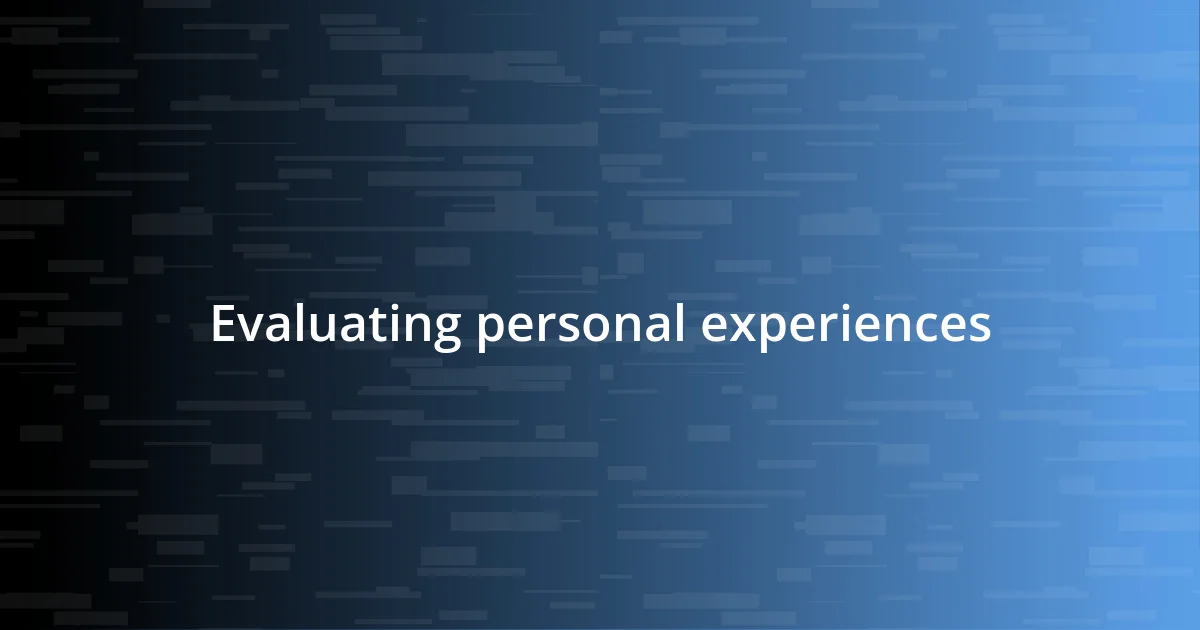
Evaluating personal experiences
Reflecting on my own experiences with cannabis, I often found that personal stories carry weight in reshaping perceptions. I vividly recall the moment I shared my cannabis journey with a close friend, who had previously expressed doubts about its use. As we discussed my personal reasons for exploring cannabis—like seeking relief from stress and better focus on creative projects—I could see their skepticism turning into curiosity. It was a reminder that opening up about our experiences can often bridge the gap between misconceptions and understanding.
- Various motivations behind using cannabis can include:
- Stress relief after a long day at work
- Enhancing creativity during artistic pursuits
- Managing chronic pain or other medical conditions
- Engaging in mindful relaxation practices
I find that sharing moments of vulnerability fosters connection. In my case, I was nervous but excited to share how cannabis had transformed my evenings from restless to restorative. This openness created a space for genuine dialogue and reflection—not only for me but for those willing to reconsider their preconceived notions. These conversations are essential, as they encourage a broader understanding of cannabis beyond the stigma attached to it.

Consulting medical professionals
When I decided to speak with my doctor about cannabis, I was a bit apprehensive. Can I trust them to take my concerns seriously? To my relief, my doctor was knowledgeable about the evolving landscape of cannabis and was open to discussing its benefits and risks. Their guidance helped me navigate the often overwhelming sea of information available out there.
During our conversation, I learned that consulting medical professionals isn’t just about getting a green light; it’s about understanding how cannabis fits into my overall health plan. My doctor didn’t shy away from discussing potential side effects and interactions with other medications I was on. I appreciated their transparency, which ultimately helped me make an informed decision that felt right for me.
The experience reaffirmed something I’ve always believed: a trustworthy medical professional can be an invaluable resource. They can help debunk myths and provide clarity amidst the noise. I walked away feeling empowered, eager to explore the potential of cannabis with a solid foundation of knowledge and a professional’s support guiding me through the process. Have you considered how a chat with your healthcare provider could change your perspective?
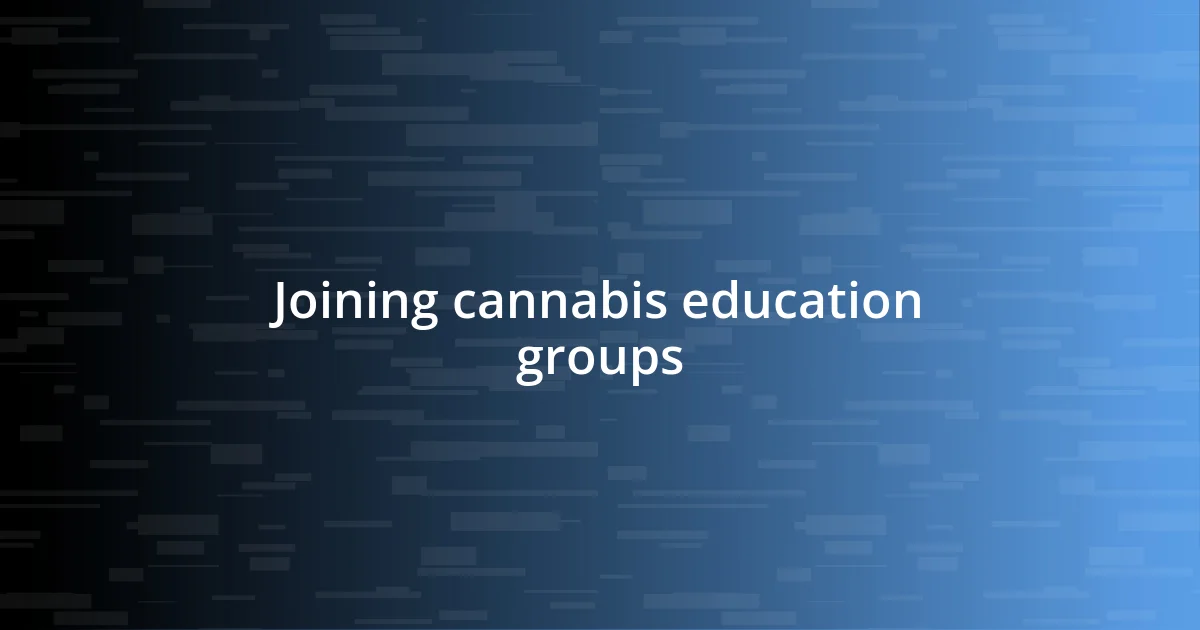
Joining cannabis education groups
Joining cannabis education groups was a turning point in my journey. At first, I was hesitant; the term “group” made me think of awkward small talk. However, once I attended my first meeting, I realized it was a community of like-minded individuals eager to share knowledge and experiences. The openness was refreshing, and I found myself engaging in discussions that challenged my assumptions. Has that ever happened to you—a moment where you realized your perceptions could shift just by being around others?
As I immersed myself in these groups, I discovered that people came from all walks of life, each with unique stories about how cannabis impacted their lives. I vividly remember hearing from a member who used cannabis to manage anxiety. Her candidness resonated with me and helped dispel some of the fears I had about its effects. These narratives provided context around cannabis use that I hadn’t considered before and made the previously abstract discussions feel very relatable.
Moreover, the educational aspect of these groups was invaluable. I learned about different strains, methods of consumption, and even the legal aspects surrounding cannabis. One evening, a knowledgeable guest speaker discussed the endocannabinoid system, and I had one of those lightbulb moments. Understanding the science behind cannabis not only demystified it for me but also made me feel more competent in discussing it with others. I began to see cannabis for what it truly is: a complex plant with potential benefits, rather than just the stigma it often carries. Have you ever found knowledge to be a powerful antidote to fear?
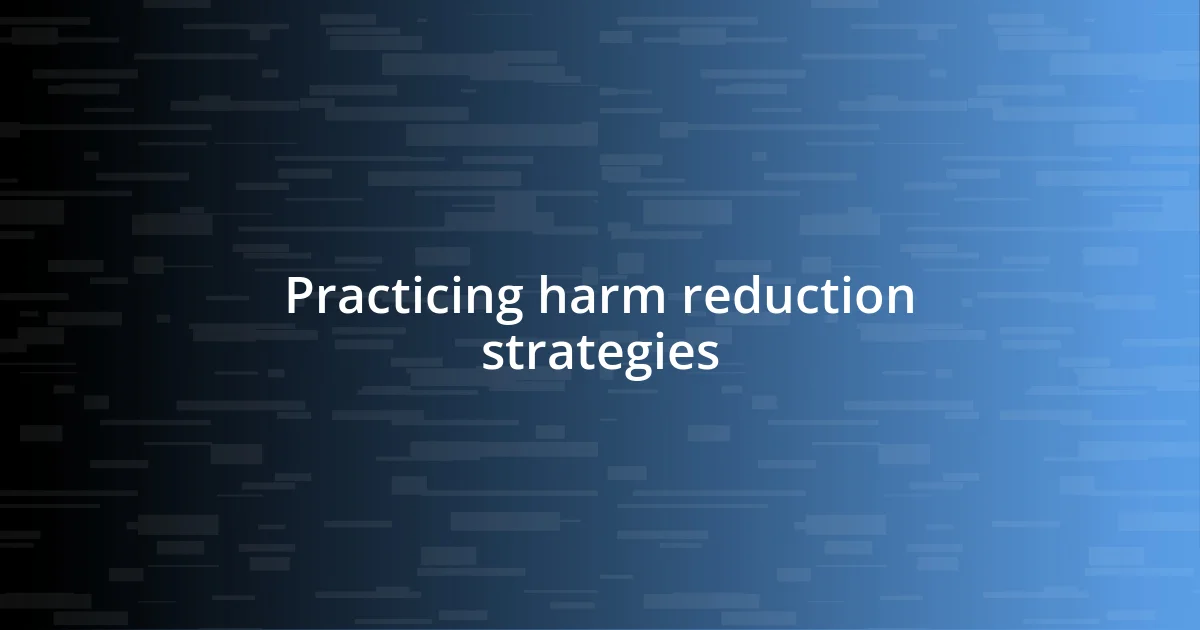
Practicing harm reduction strategies
Practicing harm reduction strategies became essential for me as I ventured deeper into the world of cannabis. Initially, I just thought that understanding the right dosage was enough, but I soon realized there’s more to it. For instance, I started keeping a journal—tracking my experiences with different strains and methods of consumption. This simple act provided me with valuable insights about how my body reacted and helped me adjust my intake accordingly. Have you ever kept a record of something that seemed minor but turned out to be significant?
I also began incorporating a safer consumption method; instead of jumping straight to edibles, which I found can be tricky to dose, I opted for vaping. Vaping felt more controllable and less intimidating. One afternoon while experimenting with a low-THC strain, I remember feeling relaxed but still clear-headed, which made for a pleasant experience. It was an eye-opener—realizing that with thoughtful choices, I could enjoy cannabis while minimizing any risks.
Furthermore, I prioritized taking breaks between uses, which really helped in managing tolerance and avoiding dependency. This practice not only gave my body time to reset but also allowed me to reflect on how cannabis affected me emotionally and physically. I found that sometimes, moderation was the key to truly appreciating the benefits without getting overwhelmed. Have you thought about whether pacing yourself could change your experience? Remember, it’s not just about use; it’s how we approach it that makes a difference.
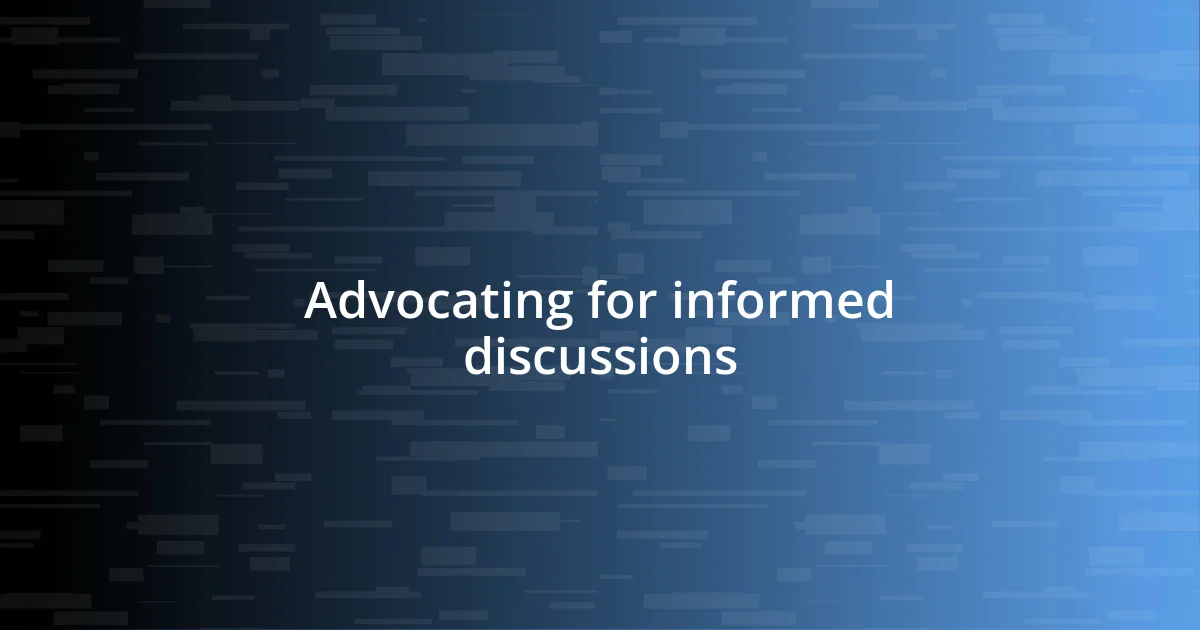
Advocating for informed discussions
Advocating for informed discussions about cannabis has been crucial in my pursuit of understanding. I once found myself in a heated debate with a friend who held strong misconceptions about its effects. Instead of getting defensive, I chose to share what I had learned, presenting facts and personal anecdotes that painted a different picture. This approach not only eased the tension but also opened up a genuine dialogue where we both learned from each other—hasn’t a conversation like that ever shifted your perspective?
I remember an instance at a local community event where a speaker addressed the historical stigmatization of cannabis. It struck me how often we base opinions on outdated narratives. Reminiscing about my own journey, I realized how easily fear can cloud judgment. Engaging in discussions that highlight factual information and personal experiences fosters a better understanding, helping to dismantle stereotypes. Can you recall a moment when learning the truth transformed your viewpoint?
Encouraging open conversations in various settings—including social gatherings and online forums—has become a passion of mine. I’ve seen firsthand how sharing personal experiences creates an inviting atmosphere for exploration and curiosity. Just recently, I joined a panel where individuals discussed their therapeutic journeys with cannabis. The authenticity in their stories compelled others to ask questions and seek understanding, turning a simple talk into a community-building experience. Isn’t it amazing how discussing something openly can propel us toward a richer understanding?
